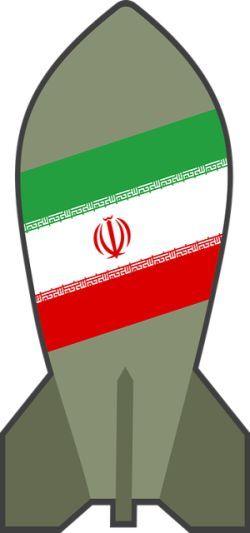Today’s Top Stories
1. For the second consecutive week, Palestinian rioters at the Kerem Shalom border crossing destroyed gas lines and other infrastructure — on the Gaza side of the crossing. The IDF estimated the rioters caused around $9 million in damage forcing Israel to close it until further notice. The destruction sounds senseless until you see what Gaza sources told Ynet about how Hamas benefits from Kerem Shalom’s closure:
A Palestinian source in Gaza, meanwhile, told Ynet that Hamas has been profiteering considerably as a result of the crossing’s destruction. The Kerem Shalom crossing is operated by the Palestinian Crossings Authority, which is controlled by the Palestinian Authority (PA) rather than Hamas, he noted.
The source then explained that Hamas was encouraging rioters to damage crossings, thereby causing the PA to lose revenue from customs and other taxes levied on incoming goods.
Bringing the goods in through the Rafah border crossing, the source added, will allow Hamas to pocket such tax levies.
Join the fight for Israel’s fair coverage in the news
2. Israel destroyed a Hamas terror tunnel which “ran by the Erez pedestrian crossing and was meters away from reaching into Israeli territory” on Saturday night. The tunnel is the ninth destroyed by the IDF since the end of October.
3. Israeli singer Netta Barzilai won the Eurovision song competition, meaning Israel will host the contest next year. The 25-year-old Barzilai’s female-empowerment song, Toy, was long among the top favorites to win, having racked up some 28 million views on YouTube. Winners are determined by a combination of international viewer votes and a jury.
The Times of Israel is already assessing how much Israel will have to spend on that. Israel hasn’t won the Eurovision competition since 1998 when Dana International took the top prize. See commentaries by David Horovitz and Eran Suissa.
Congratulations to Netta from the HonestReporting staff!

Israel and the Palestinians
• Weekly clashes along the Gaza border continued on Friday with flaming kites sparking fires, grenades, burning tires and rock throwing. Two Palestinians were killed. Friday marked the first appearance of a kite-cutting drone, which Israeli media reports say has already downed 40 kites.
https://twitter.com/AdamMilstein/status/995378295234379776
• To learn more about the army’s rules of engagement, Haaretz visited IDF snipers working along the Gaza border. The money quote:
From a second visit to the area in recent weeks and a series of discussions with commanders and soldiers, no sense can be discerned that snipers are trigger-happy, as some statements from the left wing have it.
 • Tomorrow is the ceremony marking the formal move of the US embassy in Israel from Tel Aviv to Jerusalem. With the assistance of Hungary, Romania and the Czech Republic, Israel was able to thwart a European Union condemnation of the US embassy move, according to Israeli media reports.
• Tomorrow is the ceremony marking the formal move of the US embassy in Israel from Tel Aviv to Jerusalem. With the assistance of Hungary, Romania and the Czech Republic, Israel was able to thwart a European Union condemnation of the US embassy move, according to Israeli media reports.
• See Haaretz for a nice “what you need to know” roundup about tomorrow’s embassy move. Security for the event has been three months in the making. Meanwhile, the New York Times explains why Ambassador David Friedman plans to continue splitting his time between Jerusalem and Tel Aviv even after the transfer:
That solution might be practical, given that there is little spare space in the Jerusalem building, and most of the embassy staff will be remaining in the Tel Aviv branch of the embassy for the time being. But it may also help get around any diplomatic awkwardness, allowing the ambassador, David M. Friedman, to continue to host officials whose countries oppose the American embassy move.
Iranian Threat
• If conflict with Iran escalates, how would the Israel economy fare? Calcalist crunched a lot of numbers.
Protracted military engagement would undoubtedly be harmful to Israel’s economic activity, but financial indicators, such as foreign exchange rates, suggest the country is perhaps better prepared than it has ever been for to weather a conflict.
• AFP assesses Russian efforts to mediate between Israel and Iran.
• The sign of the times (part 1) isn’t that Bahrain backed Israel’s strikes on Iranian positions in Syria. It’s that Foreign Minister Khalid bin Ahmed Al-Khalifa A) said so publicly B) in Arabic C) on Twitter.
 • Sign of the times (part 2): The Associated Press learned of some impromptu “dinner diplomacy” that took place in March.
• Sign of the times (part 2): The Associated Press learned of some impromptu “dinner diplomacy” that took place in March.
The UAE and Qatari ambassadors to the US were in Washington’s Cafe Milano along with a State Dept. official and some journalists when they discovered Benjamin Netanyahu was coincidentally also dining there and passed along a message to the PM asking if he’d join them:
It wasn’t long before Netanyahu and his wife came over to say hello on their way out. They lingered, answering a few questions from the group about Iran and other issues. There were smiles, a few laughs about the oddity of the situation, and Netanyahu shook hands with the two ambassadors before leaving the restaurant . . .
In and of itself, the interaction does not signal any historic establishment of ties between Israel and the UAE or any other country. Yet it casts light on how friendly cooperation between the Jewish state and the Arab Gulf nations, until recently kept behind the scenes, are creeping into public view.
• Sign of the times (part 3): Coverage of Israeli strike in Arab media reflects divisions.
• Russia, after Netanyahu visit, backs off Syria S-300 missile supplies, Reuters reports.
• Ynet: The real target of last month’s T-4 attack: an Iranian-made aerial defense system called “The Third Khordad.”
Once the system was unloaded off of an Iranian transport plane on the Syrian T-4 base, it was destroyed before even being unpacked.
The 3rd Khordad system, developed and manufactured by the Islamic Revolutionary Guard Corps (IRGC)’s military industries, was seemingly a copy of the aforementioned Russian S-300—a system capable of intercepting not only planes but also missiles, rockets, cruise missiles and drones deep within Israeli territory.

• According to an Arab media report picked up by Haaretz, Russia gave Iran advance warning of Israel’s plans to attack Iranian positions in Syria.
• While Israel has offered humanitarian aid to civilians of southern Syria, I don’t know of any Israeli-aligned “proxies” that would be the equivalent of Iran’s string-pulling relationship with Hezbollah. Where did AP get this line from?
The two rivals have long fought each other through proxies, and with the new exchange each seemed to be sending a warning that a direct clash between them could swiftly escalate.
• Netanyahu’s spokesman, David Keyes discussed the Iranian threat with Channel 4‘s Jon Snow.
Around the World
 • Executives from the German Bank for Social Economy may be included in the Simon Wiesenthal Center’s top 10 list of antisemitic activity, the Jerusalem Post reports.
• Executives from the German Bank for Social Economy may be included in the Simon Wiesenthal Center’s top 10 list of antisemitic activity, the Jerusalem Post reports.
Critics say the Cologne-based BFS is a hotbed of BDS activity. The bank maintains at least four accounts that directly or indirectly aid the BDS campaign to undermine and dismantle the existence of Israel.
• Amsterdam kosher eatery’s owner will close shop unless police curb antisemitic vandalism
• Following a fatal stabbing in Paris, a Jewish lawmaker says France is suffering an “intifada.”
Commentary
• US envoy Jason Greenblatt got Jerusalem Post op-ed space to denounce Hamas for failing its own people and taking Gaza back to the Stone Age.
 • Here’s what else I’m reading this weekend about the embassy move, Jerusalem and the Palestinians this weekend . . .
• Here’s what else I’m reading this weekend about the embassy move, Jerusalem and the Palestinians this weekend . . .
– Gilad Erdan: How Trump’s Jerusalem embassy decision could lead to peace for Israel
– Josefin Dolsten: Why these Latin American countries support moving their embassies to Jerusalem
– Aaron David Miller: Five myths about the US embassy move to Jerusalem
– Abigail Shrier: Trump’s Jerusalem stand
– David Harris: May 14, 2018, a historic day
– Avi Issacharoff: It’s make-or-break time for Hamas in Gaza
– Ben-Dror Yemini: Gazans are victims of an ideology of hatred
– Alex Traiman: Jerusalem is rising as Israel’s enemies falter
– Michael Goodwin: Getting a grip on Israel’s future
– Alan Baker: Did the Palestinians ever really recognize Israel?
– Alex Ryvchin: Arab leaders, not Britain, to blame for Palestinian plight
 • Here’s what else I’m reading about tensions with Iran . . .
• Here’s what else I’m reading about tensions with Iran . . .
– Raphael Ahren: Despite global vows of support, Israel stands alone against Iran in Syria
– National Post (staff-ed): Israel is left to contain the Iranian threat that Obama ignored
– Abdulrahman Al-Rashed: Which side are you on? Iran or Israel?
– Julie Lenarz: Why we must stand with Trump and Israel to stop Iran from creating a Shiite empire
– Amos Harel: Iran’s entrenchment in Syria set back months after most extensive Israeli strikes in decades
– Jonathan Spyer: Under fire but unfazed, Israel plays the waiting game with Iran
– Ron Ben-Yishai: Israel, Iran walking on the precipice
– David Horovitz: Israel has the upper hand over Iran in Syria, but the ayatollahs won’t give up
– Michael Oren: Trump made the right choice on Iran
– Herb Keinon: Putin stops neither Iran nor Israel in Syria
– Jack Goldsmith: How legally binding is the Iranian nuclear deal?
– Maj. Gen. (ret.) Yaakov Amidror: Don’t ease up
– Seth Frantzman: Putin is now key to restraining Iran in Syria
– Anshel Pfeffer: Putin gives Israel a free hand against Iran, but he may soon have to pick a side
– Dr. Mordechai Kedar: Iran is in trouble
– Melanie Phillips: The elephant in the room is regime change
– Prof. Shmuel Sandler: Mideast peace will come through containment of Iranian threat
– Vivian Bercovici: The vanity and art of the deal
Featured image: CC BY-NC-ND J McDowell; US flag CC BY-NC-ND Bill Dickinson; Third Khordad via YouTube/armyreco; German flag CC BY-SA Emanuele; Iranian bomb CC0 Pixabay;
For more, see yesterday’s Israel Daily News Stream and join the IDNS on Facebook.
Before you comment on this article, please remind yourself of our Comments Policy. Any comments deemed to be in breach of the policy will be removed at the editor’s discretion.


